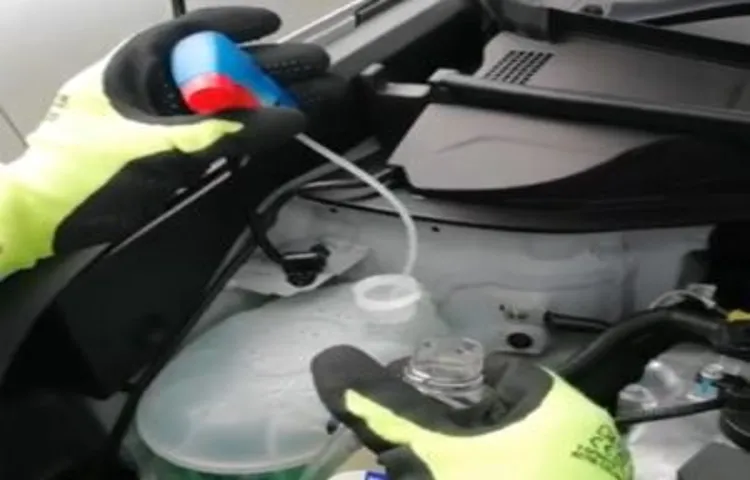Do you know what to do with old coolant when it’s time for a flush and refill? Many car owners are unsure about the proper way to dispose of coolant, which is a critical component in keeping your engine running cool. While dumping it down the drain or tossing it in the trash might seem like convenient options, they are not environmentally friendly or safe. Coolant, also known as antifreeze, contains toxic chemicals that can be harmful to humans, animals, and the environment.
Improper disposal can contaminate water sources, harm marine life, and contribute to pollution. It’s crucial to handle coolant disposal responsibly to protect our planet and our health. So, where should you dispose of coolant? The good news is that there are several safe and convenient options available.
Some auto parts stores and repair shops offer coolant recycling programs, allowing you to drop off your old coolant for proper disposal. These facilities have the necessary equipment and knowledge to handle and recycle coolant safely. In addition to local businesses, many municipalities and waste management facilities have collection programs for hazardous materials, including coolant.
These programs may have specific guidelines for how to prepare and transport the coolant for drop-off, so it’s essential to check with your local authorities for more information. Another option is to contact your local recycling center. Some recycling centers accept coolant for recycling, often free of charge.
They will have the expertise to properly handle and recycle the coolant, ensuring it does not harm the environment. If none of these options are available in your area, you can consider contacting your local environmental protection agency or health department for guidance on how to dispose of coolant safely. They will be able to provide you with the necessary information and resources to handle coolant disposal in compliance with local regulations.
Remember, coolant is a hazardous material, and it should never be poured down the drain, into the ground, or mixed with regular trash. By disposing of coolant responsibly, you are not only protecting the environment but also contributing to a cleaner and healthier future. In conclusion, disposing of coolant properly is crucial to protect our environment and ensure the safety of our communities.
Table of Contents
1. Local Waste Management Facilities
If you’re wondering where you can dispose of coolant, don’t worry – there are several options available to you. One of the best places to start is at your local waste management facilities. These facilities are equipped to handle various types of waste, including coolant.
They have the necessary tools and resources to safely dispose of coolant without harming the environment. Additionally, waste management facilities often have specific protocols in place for disposing of hazardous waste such as coolant, ensuring that it is handled properly. So, if you find yourself with leftover coolant that you need to get rid of, reach out to your local waste management facility for guidance and assistance.
They will be able to provide you with the necessary information and help you dispose of your coolant in a responsible and environmentally-friendly way.
Accepted Coolant Types
“local waste management facilities” Coolant is an essential component in various industries and machinery, but what do you do with it once it’s no longer usable? One option is to dispose of it at local waste management facilities. These facilities have the expertise and equipment to handle coolant safely and efficiently. When you take your coolant to a waste management facility, they will have processes in place to test and separate any contaminants from the fluid.
This ensures that the coolant can be recycled or disposed of properly without harming the environment. By choosing to utilize local waste management facilities, you can have peace of mind knowing that your coolant is being handled in a responsible manner.

Location and Contact Information
Local Waste Management Facilities When it comes to waste management, it’s important to know where to dispose of your garbage responsibly. Luckily, there are several local waste management facilities in our area that can help. One facility, located on Maple Street, specializes in recycling paper and cardboard.
They have state-of-the-art machinery that can efficiently process and repurpose these materials, reducing the strain on our landfills. Another facility, just a few blocks away on Elm Avenue, focuses on composting organic waste. By separating food scraps and yard waste from the rest of our garbage, they are able to create nutrient-rich compost that can be used to enrich soils and grow healthier plants.
Additionally, on Oak Street, there is a facility that specializes in hazardous waste disposal. They have a team of trained professionals who can handle and dispose of harmful chemicals and materials safely. By bringing our hazardous waste to this facility, we can help protect our environment and prevent pollution.
With the convenience of these local waste management facilities, it’s easier than ever to take care of our waste responsibly. So next time you have something to dispose of, remember to seek out the appropriate facility and do your part in keeping our community clean and green.
2. Auto Parts Stores
If you’re wondering where you can dispose of coolant, one of the best options is to take it to an auto parts store. Many auto parts stores have recycling programs in place to properly dispose of hazardous materials like coolant. They will typically have designated collection sites or bins where you can drop off your old coolant for proper disposal.
By taking your coolant to an auto parts store, you ensure that it is handled and disposed of in an environmentally friendly way. This helps to protect our water sources and prevent contamination. So next time you need to get rid of coolant, consider taking it to your local auto parts store for proper disposal.
Coolant Recycling Programs
auto parts stores, coolant recycling programs, coolant disposal, environmental responsibility When it comes to car maintenance, many people quickly realize the importance of routine oil changes and tire rotations. However, one aspect of car care that often goes overlooked is the proper disposal of coolant. Coolant, also known as antifreeze, is a crucial part of a vehicle’s cooling system.
It helps regulate the engine temperature and prevents it from overheating. But what happens when the coolant needs to be replaced? Many auto parts stores now offer coolant recycling programs, making it easy for customers to dispose of their old coolant in an environmentally responsible way. These programs collect used coolant and send it off to be recycled or properly disposed of, preventing it from polluting the environment.
By participating in these programs, you can ensure that your coolant is disposed of correctly and do your part in taking care of the environment. So the next time you need to replace your coolant, consider visiting your local auto parts store and taking advantage of their recycling program.
Location and Contact Information
One of the best places to find auto parts is at an auto parts store. These stores are conveniently located and offer a wide variety of parts for all types of vehicles. Whether you’re looking for a new battery, a set of spark plugs, or a replacement alternator, you can find it at an auto parts store.
Not only do they have a large inventory of parts, but they also have knowledgeable staff who can help you find exactly what you need. Plus, if you’re not sure how to install the part yourself, they can provide guidance or even recommend a local mechanic who can assist you. So whether you’re a do-it-yourselfer or you prefer to leave it to the professionals, an auto parts store is a great resource for all your automotive needs.
3. Quick Lube Centers
If you’re wondering where you can dispose of coolant, one convenient option is to visit a Quick Lube Center. These centers are typically equipped to handle various automotive fluids, including coolant. When you bring your coolant for disposal, the center will ensure that it is handled and disposed of safely and properly.
Quick Lube Centers are a great choice because they have the knowledge and expertise to handle coolant disposal in an environmentally friendly manner. So next time you have some old coolant to get rid of, consider taking it to a Quick Lube Center for hassle-free disposal.
Coolant Disposal Services
Are you looking for a quick and hassle-free way to dispose of your coolant? Look no further than quick lube centers. These convenient centers not only offer oil changes and other automotive services, but they also provide coolant disposal services. When you bring your vehicle in for an oil change or any other service that requires coolant replacement, the quick lube center will responsibly dispose of the old coolant for you.
This ensures that the coolant is properly recycled or disposed of in accordance with environmental regulations. By utilizing the coolant disposal services offered by quick lube centers, you can have peace of mind knowing that you are taking care of both your vehicle and the environment.
Location and Contact Information
Looking for a quick and convenient way to get your oil changed? Look no further than Quick Lube Centers! Our locations are strategically placed throughout the city to ensure that you can easily find one near you. Whether you’re running errands or on your morning commute, our centers are always just a short distance away. And if you’re not sure where to find us, just give us a call! Our friendly staff is always ready to assist you and provide directions to the nearest location.
We understand that your time is valuable, so we strive to make your visit as efficient as possible. So why wait? Visit one of our Quick Lube Centers today and experience the quick and convenient oil change you’ve been looking for!
4. Environmental Agencies
If you’re wondering where you can dispose of coolant, one option you could consider is reaching out to local environmental agencies. These agencies are responsible for ensuring the protection of the environment and can provide guidance on proper disposal methods for various substances, including coolant. They have the knowledge and resources to assist you in finding a suitable disposal facility or recommend alternative solutions.
By engaging with environmental agencies, you can rest assured knowing that you are making an eco-friendly choice and contributing to the overall well-being of the environment. So, why not take a proactive approach and seek the expertise of these agencies when it comes to disposing of coolant?
Proper Coolant Disposal Guidelines
One important aspect of proper coolant disposal is following the guidelines set by environmental agencies. These agencies play a vital role in ensuring that our environment is protected from the harmful effects of coolant waste. They provide guidelines and regulations for the safe disposal of coolant, including how to handle, store, and transport it.
By adhering to these guidelines, we can help prevent pollution and contribute to a healthier and cleaner environment. It’s essential to stay informed about the specific guidelines provided by the environmental agencies in your area and to follow them diligently. This ensures that your coolant waste is disposed of properly and does not harm the environment or pose a danger to human health.
So, let’s all do our part and follow the guidelines set by environmental agencies to make sure that our coolant disposal practices are environmentally responsible.
Contact Information
environmental agencies. If you’re looking to get in touch with environmental agencies, you’re in luck! These organizations play a crucial role in protecting our planet and ensuring a sustainable future for all. Whether you have a question about environmental regulations, want to report a pollution incident, or simply need some advice on how to live a more eco-friendly lifestyle, environmental agencies are here to help.
They are staffed with knowledgeable professionals who are passionate about the environment and are dedicated to making a difference. So don’t hesitate to reach out to them through their contact information, which can usually be found on their websites. Remember, we all have a responsibility to take care of our planet, and environmental agencies are an invaluable resource in helping us do just that.
Conclusion
Well, looks like you’re in quite a pickle with your coolant conundrum! But fear not, for I have the perfect solution for you. Instead of trying to figure out where to dispose of your coolant, why not think outside the box and give it a second chance at life? Hear me out – coolants are made up of various chemicals that can be harmful to the environment if not properly handled. However, by recycling and reusing coolant, you can not only ensure its responsible disposal but also contribute to a sustainable future.
So, how can you do that? You might ask. It’s simple! Contact your local recycling centers or waste management facilities and inquire if they accept used coolants. Many places have programs in place to collect and process hazardous materials like coolant, so they are handled appropriately.
By doing so, you’re not only doing your part in reducing harmful waste but also giving your coolant a chance to be transformed into something new and useful. Now, I must admit, recycling coolant may not be as thrilling as defusing a bomb, but hey, it’s a responsible and eco-friendly way to dispose of it. Plus, think of it as your own heroic act, protecting our environment from the hazardous clutches of coolant.
So, why not give it a shot? Who knew disposing of coolant could be both practical and environmentally friendly? Now go forth, recycle that coolant, and save the world, one drop at a time!”
FAQs
Where can I dispose of coolant?
Coolant should never be disposed of in regular trash or poured down the drain. It contains harmful chemicals that can contaminate water sources. It is best to take coolant to a recycling center or an automotive shop that accepts hazardous waste for proper disposal.
Can I recycle coolant?
Yes, coolant can be recycled. Recycling centers or automotive shops may have specific guidelines on how to properly dispose of coolant for recycling. It is important to follow these guidelines to ensure safe and environmentally-friendly disposal.
What are the environmental impacts of improper coolant disposal?
Improper coolant disposal can have severe negative impacts on the environment. Coolant contains toxic chemicals that can contaminate water sources, harm aquatic life, and pollute soil. It is crucial to dispose of coolant properly to prevent these environmental consequences.
Are there any alternatives to disposing of coolant?
Yes, in some cases, coolant can be reused or treated before disposal. Coolant can be filtered and decontaminated, allowing it to be used again. This reduces the need for disposal and minimizes waste. Contact a local mechanic or recycling center to inquire about coolant reuse or treatment options.
What are the legal requirements for disposing of coolant?
The disposal of coolant is regulated to protect the environment and public health. Local, state, or national regulations may vary, so it is important to check with relevant authorities or waste management agencies for specific guidelines. In general, coolant should be disposed of at designated recycling centers or hazardous waste facilities.
Can I mix coolant with other liquids for disposal?
It is not advisable to mix coolant with other liquids for disposal. Coolant contains specific chemicals that require proper handling and treatment. Mixing it with other liquids may complicate the disposal process and increase environmental risks. Follow the recommended disposal guidelines for coolant to ensure safe and responsible disposal.
What should I do if I have large quantities of coolant to dispose of?
If you have large quantities of coolant to dispose of, it is recommended to contact your local waste management agency or recycling center. They can provide guidance on how to handle and properly dispose of the coolant. Some facilities may even offer collection services for larger amounts of coolant.


